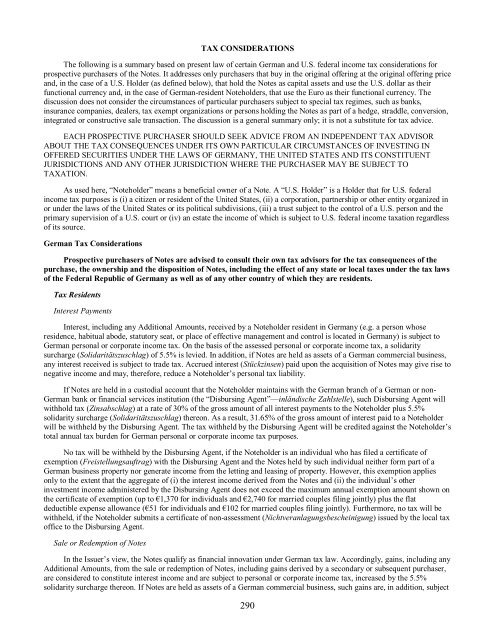iesy Repository GmbH - Irish Stock Exchange
iesy Repository GmbH - Irish Stock Exchange
iesy Repository GmbH - Irish Stock Exchange
You also want an ePaper? Increase the reach of your titles
YUMPU automatically turns print PDFs into web optimized ePapers that Google loves.
TAX CONSIDERATIONS<br />
The following is a summary based on present law of certain German and U.S. federal income tax considerations for<br />
prospective purchasers of the Notes. It addresses only purchasers that buy in the original offering at the original offering price<br />
and, in the case of a U.S. Holder (as defined below), that hold the Notes as capital assets and use the U.S. dollar as their<br />
functional currency and, in the case of German-resident Noteholders, that use the Euro as their functional currency. The<br />
discussion does not consider the circumstances of particular purchasers subject to special tax regimes, such as banks,<br />
insurance companies, dealers, tax exempt organizations or persons holding the Notes as part of a hedge, straddle, conversion,<br />
integrated or constructive sale transaction. The discussion is a general summary only; it is not a substitute for tax advice.<br />
EACH PROSPECTIVE PURCHASER SHOULD SEEK ADVICE FROM AN INDEPENDENT TAX ADVISOR<br />
ABOUT THE TAX CONSEQUENCES UNDER ITS OWN PARTICULAR CIRCUMSTANCES OF INVESTING IN<br />
OFFERED SECURITIES UNDER THE LAWS OF GERMANY, THE UNITED STATES AND ITS CONSTITUENT<br />
JURISDICTIONS AND ANY OTHER JURISDICTION WHERE THE PURCHASER MAY BE SUBJECT TO<br />
TAXATION.<br />
As used here, “Noteholder” means a beneficial owner of a Note. A “U.S. Holder” is a Holder that for U.S. federal<br />
income tax purposes is (i) a citizen or resident of the United States, (ii) a corporation, partnership or other entity organized in<br />
or under the laws of the United States or its political subdivisions, (iii) a trust subject to the control of a U.S. person and the<br />
primary supervision of a U.S. court or (iv) an estate the income of which is subject to U.S. federal income taxation regardless<br />
of its source.<br />
German Tax Considerations<br />
Prospective purchasers of Notes are advised to consult their own tax advisors for the tax consequences of the<br />
purchase, the ownership and the disposition of Notes, including the effect of any state or local taxes under the tax laws<br />
of the Federal Republic of Germany as well as of any other country of which they are residents.<br />
Tax Residents<br />
Interest Payments<br />
Interest, including any Additional Amounts, received by a Noteholder resident in Germany (e.g. a person whose<br />
residence, habitual abode, statutory seat, or place of effective management and control is located in Germany) is subject to<br />
German personal or corporate income tax. On the basis of the assessed personal or corporate income tax, a solidarity<br />
surcharge (Solidaritätszuschlag) of 5.5% is levied. In addition, if Notes are held as assets of a German commercial business,<br />
any interest received is subject to trade tax. Accrued interest (Stückzinsen) paid upon the acquisition of Notes may give rise to<br />
negative income and may, therefore, reduce a Noteholder’s personal tax liability.<br />
If Notes are held in a custodial account that the Noteholder maintains with the German branch of a German or non-<br />
German bank or financial services institution (the “Disbursing Agent”—inländische Zahlstelle), such Disbursing Agent will<br />
withhold tax (Zinsabschlag) at a rate of 30% of the gross amount of all interest payments to the Noteholder plus 5.5%<br />
solidarity surcharge (Solidaritätszuschlag) thereon. As a result, 31.65% of the gross amount of interest paid to a Noteholder<br />
will be withheld by the Disbursing Agent. The tax withheld by the Disbursing Agent will be credited against the Noteholder’s<br />
total annual tax burden for German personal or corporate income tax purposes.<br />
No tax will be withheld by the Disbursing Agent, if the Noteholder is an individual who has filed a certificate of<br />
exemption (Freistellungsauftrag) with the Disbursing Agent and the Notes held by such individual neither form part of a<br />
German business property nor generate income from the letting and leasing of property. However, this exemption applies<br />
only to the extent that the aggregate of (i) the interest income derived from the Notes and (ii) the individual’s other<br />
investment income administered by the Disbursing Agent does not exceed the maximum annual exemption amount shown on<br />
the certificate of exemption (up to €1,370 for individuals and €2,740 for married couples filing jointly) plus the flat<br />
deductible expense allowance (€51 for individuals and €102 for married couples filing jointly). Furthermore, no tax will be<br />
withheld, if the Noteholder submits a certificate of non-assessment (Nichtveranlagungsbescheinigung) issued by the local tax<br />
office to the Disbursing Agent.<br />
Sale or Redemption of Notes<br />
In the Issuer’s view, the Notes qualify as financial innovation under German tax law. Accordingly, gains, including any<br />
Additional Amounts, from the sale or redemption of Notes, including gains derived by a secondary or subsequent purchaser,<br />
are considered to constitute interest income and are subject to personal or corporate income tax, increased by the 5.5%<br />
solidarity surcharge thereon. If Notes are held as assets of a German commercial business, such gains are, in addition, subject<br />
290

















